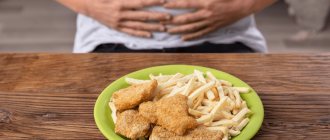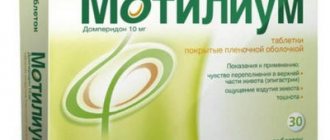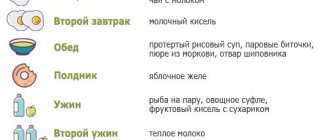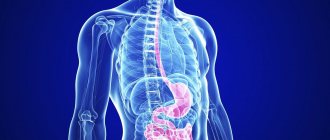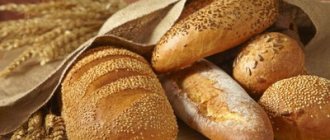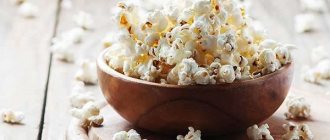In case of illness, nutritional therapy becomes the basis of corrective therapy. If you do not adjust your diet, drug treatment will not bring the desired result. This is why doctors always insist on following a certain diet. Practice shows that with timely changes in diet, remission occurs much faster, and the treatment itself becomes less long and serious.
Today, experts from the Wellness Consulting Academy will talk about nutrition for gastritis, give recommendations on the menu and a list of prohibited foods...
General rules
Erosive gastritis is an acute/chronic inflammation of the stomach, which is characterized by the formation of single/multiple erosions (ulcerations) of various sizes on the surface of the mucous membrane that do not penetrate into the deep layers of the stomach wall and heal without scar formation. It is the depth of the erosive defect that is the main distinguishing feature from gastric ulcer , in which the defect extends to the deeper layers of the stomach.
The clinical picture of the disease is polymorphic, but the main symptoms are “hungry” pain in the epigastrium, dyspepsia (dry/bitterness in the mouth, bloating, belching , discomfort/heaviness in the stomach), nausea, vomiting, constipation / diarrhea , blood in the vomit masses and stool.
Treatment of the disease is complex and is aimed at stopping the inflammatory process, reducing excess secretion and reducing the aggressiveness of gastric juice, normalizing the motor function of the stomach, and stimulating the regeneration of mucosal defects. Diet for erosive gastritis of the stomach is an essential component of therapy, however, if the etiological factor of the disease is the bacterium Helicobacter pylori, which is often the case if the antrum of the stomach is involved in the process, eradication therapy with antibiotics .
When diagnosed with erosive gastritis, diet and treatment are largely determined by the level of acidity of gastric juice. Since in the vast majority of cases, erosive gastritis occurs against the background of increased/normal acidity with increased secretory function, Table No. 1 according to Pevzner and its varieties are taken as the basis for therapeutic nutrition. Therapeutic nutrition is aimed at protecting the gastric mucosa from the effects of negative factors, reducing the activity of acid formation and excitability of the stomach, eliminating dyspeptic disorders/pain, and normalizing the motor function of the stomach.
In case of acute erosive gastritis or during an exacerbation of the chronic form, it is recommended to prescribe fasting on the first day, allowing the intake of only free liquid, if this does not increase pain, nausea and vomiting. On the second day, you are allowed to consume rice mucous soup, jelly, meat soufflé, and rosehip decoction.
On the third day, white crackers, vegetable puree, steamed cutlets/meatballs, and weak chicken broth are introduced into the diet. After relief of acute manifestations, the patient is assigned to the main Table No. 1 . In cases of acute, unrelieved symptoms, Table No. 1A , which provides for a maximum limitation of various types of effects on the gastric mucosa for a period of 7-10 days, after which the patient is transferred to treatment Table No. 1B , which is characterized by less pronounced restrictions for a period of 10-14 days and then on to Diet No. 1 .
Unlike Diets No. 1A and No. 1B, therapeutic Table No. 1 is physiologically balanced and complete in all food nutrients (90-95 proteins, 100 g of fat and 350-400 g of carbohydrates). The energy value of the diet is at the level of 2900-3000 kcal/day, which allows it to be prescribed for a long period (3-6 months). The basic principles of nutrition on the treatment table No. 1 are:
- Exclusion of products/dishes that stimulate secretion (concentrated meat/fish broths, mushrooms, smoked meats, coffee, carbonated drinks, alcohol), as well as all products that irritate the gastric mucosa (rough/fried foods, cranberries, salty, spicy, pickled dishes, onions, seasonings, radishes, citrus juices, garlic, ginger, radish, sour fruit juices) and products that promote gas formation processes (legumes, cabbage, kvass).
- Reducing animal fats in the diet (fatty pork, goose, duck, meat products). Butter is added only to prepared dishes.
- Reducing the volume of food per meal (no more than 250 g).
- Fractional meals (up to 6 times/day), ensuring better digestion of food and its absorption.
- Consume foods/dishes only when they are warm.
- Cooking methods - boiling, stewing/baking.
Gradually, the diet expands to the diet familiar to every person, but spicy foods, spices, herbs, smoked foods, pickles, canned food, fatty meat/fish products, and animal fats are still excluded. It is important to prevent the occurrence of complications of chronic erosive gastritis by switching from the usual diet to a dietary one when provoking factors appear (stress, exams, business trips).
Sample menu for diet day No. 1.
- First breakfast: a steamed omelette of two eggs or two soft-boiled eggs, a glass of milk or weak tea with milk.
- Second breakfast: milk or fruit jelly.
- Lunch: Milk oatmeal slimy soup, chicken or fish steam soufflé, fruit jelly or fruit jelly.
- Afternoon snack: rosehip decoction.
- Dinner: pureed milk rice or oatmeal, milk or fruit jelly.
- At night: milk.
A medical diet is prescribed only by the attending physician , who has full knowledge of the medical history of a particular patient.
Authorized Products
Nutrition for erosive gastritis with high acidity includes inclusion in the diet:
- Weak vegetable broths and first courses based on it, to which carefully pureed cereals (white rice, semolina, oatmeal, buckwheat), vermicelli/thin noodles, vegetables are added and seasoned with butter or an egg-milk mixture. It is allowed to add dill and pureed meat in small quantities.
- Lean meats (chicken, beef, turkey, lamb) in the form of boiled/steamed cutlets and baked dishes. The meat must be pre-boiled and then subjected to further cooking.
- Low-fat river/sea fish, with the skin removed and steamed/baked in pieces or chopped in the form of cutlets, meatballs, zraz.
- Porridges boiled in water to a semi-viscous state (white rice, buckwheat, oatmeal), vermicelli/thin noodles in the form of baked krupenik with cottage cheese and puddings.
- Various boiled vegetables (new peas, potatoes, beets, cauliflower, carrots), prepared in pureed form (puree) with the addition of butter.
- Dried/day-old white bread, cookies and biscuits.
- Non-acidic fermented milk and dairy products (fresh cottage cheese, yogurt, kefir), sour cream only in ready-made dishes. It is allowed to eat dishes made from cottage cheese (puddings, cheesecakes, dumplings), occasionally mild cheese in grated form, and eggs in the form of a steam omelet.
- Non-acidic desserts from pureed berries/fruits, baked/stewed or in the form of jelly, puree, jelly, compotes. It is allowed to eat non-sour jam, meringues, honey, marshmallows, and marshmallows.
- Rosehip decoction, fruit juices, weak tea/coffee with milk.
Table of permitted products
| Proteins, g | Fats, g | Carbohydrates, g | Calories, kcal | |
Vegetables and greens | ||||
| zucchini | 0,6 | 0,3 | 4,6 | 24 |
| cauliflower | 2,5 | 0,3 | 5,4 | 30 |
| potato | 2,0 | 0,4 | 18,1 | 80 |
| carrot | 1,3 | 0,1 | 6,9 | 32 |
| beet | 1,5 | 0,1 | 8,8 | 40 |
| pumpkin | 1,3 | 0,3 | 7,7 | 28 |
Fruits | ||||
| apricots | 0,9 | 0,1 | 10,8 | 41 |
| bananas | 1,5 | 0,2 | 21,8 | 95 |
| nectarine | 0,9 | 0,2 | 11,8 | 48 |
| peaches | 0,9 | 0,1 | 11,3 | 46 |
| apples | 0,4 | 0,4 | 9,8 | 47 |
Berries | ||||
| strawberry | 0,8 | 0,4 | 7,5 | 41 |
| raspberries | 0,8 | 0,5 | 8,3 | 46 |
Cereals and porridges | ||||
| buckwheat (kernel) | 12,6 | 3,3 | 62,1 | 313 |
| semolina | 10,3 | 1,0 | 73,3 | 328 |
| cereals | 11,9 | 7,2 | 69,3 | 366 |
| white rice | 6,7 | 0,7 | 78,9 | 344 |
Flour and pasta | ||||
| noodles | 12,0 | 3,7 | 60,1 | 322 |
Bakery products | ||||
| white bread crackers | 11,2 | 1,4 | 72,2 | 331 |
Confectionery | ||||
| jam | 0,3 | 0,2 | 63,0 | 263 |
| jelly | 2,7 | 0,0 | 17,9 | 79 |
| marshmallows | 0,8 | 0,0 | 78,5 | 304 |
| paste | 0,5 | 0,0 | 80,8 | 310 |
Raw materials and seasonings | ||||
| honey | 0,8 | 0,0 | 81,5 | 329 |
| sugar | 0,0 | 0,0 | 99,7 | 398 |
| milk sauce | 2,0 | 7,1 | 5,2 | 84 |
Dairy | ||||
| milk | 3,2 | 3,6 | 4,8 | 64 |
| kefir | 3,4 | 2,0 | 4,7 | 51 |
| cream | 2,8 | 20,0 | 3,7 | 205 |
| sour cream | 2,8 | 20,0 | 3,2 | 206 |
| curdled milk | 2,9 | 2,5 | 4,1 | 53 |
Cheeses and cottage cheese | ||||
| cottage cheese | 17,2 | 5,0 | 1,8 | 121 |
Meat products | ||||
| boiled beef | 25,8 | 16,8 | 0,0 | 254 |
| beef liver | 17,4 | 3,1 | 0,0 | 98 |
| boiled beef tongue | 23,9 | 15,0 | 0,0 | 231 |
| boiled veal | 30,7 | 0,9 | 0,0 | 131 |
| rabbit | 21,0 | 8,0 | 0,0 | 156 |
Bird | ||||
| boiled chicken | 25,2 | 7,4 | 0,0 | 170 |
| turkey | 19,2 | 0,7 | 0,0 | 84 |
Eggs | ||||
| chicken eggs | 12,7 | 10,9 | 0,7 | 157 |
Oils and fats | ||||
| butter | 0,5 | 82,5 | 0,8 | 748 |
| ghee | 0,2 | 99,0 | 0,0 | 892 |
Non-alcoholic drinks | ||||
| coffee with milk and sugar | 0,7 | 1,0 | 11,2 | 58 |
| black tea with milk and sugar | 0,7 | 0,8 | 8,2 | 43 |
Juices and compotes | ||||
| apricot juice | 0,9 | 0,1 | 9,0 | 38 |
| carrot juice | 1,1 | 0,1 | 6,4 | 28 |
| pumpkin juice | 0,0 | 0,0 | 9,0 | 38 |
| * data is per 100 g of product | ||||
Dish recipes
It is not recommended to buy ready-made mixtures for making jelly in stores, which include dyes, preservatives and other chemical additives. Jelly from frozen fruits. Put washed cherries (about 300 g) and cranberries (200 g), add 6-7 tbsp. sugar and add water (liter). Cook for two hours. At this time, dilute the starch in water and gradually add to the jelly. In a few minutes the jelly is ready.- Salmon soup. The tail must be washed and placed in a pan and filled with water. Bring to a boil, skim off the foam and add a peeled onion and a few bay leaves to the broth. Salmon does not take long to cook. While the broth is cooking, peel the potatoes and cut them into large cubes. Carrots also need to be cut into thick slices. Place the tail, discard the onion and bay leaves. Add prepared vegetables, salmon steak and a few peppercorns to the boiling broth and cook until tender, about 20 minutes. The dish is ready and can be served.
Fully or partially limited products
The diet for erosive gastritis with high acidity involves excluding from the diet:
- Raw vegetables (white cabbage, radishes, tomatoes, radishes, rutabaga, turnips, beans, onions, peas, sorrel, garlic), mushrooms and hard-skinned fruits as they contain coarse dietary fiber and irritate the gastric mucosa.
- Products containing large quantities of connective tissue (skin, veins, cartilage) are difficult to digest.
- Highly extractive meat/fish broths, borscht, cabbage soup, okroshka.
- Animal/cooking fats, mayonnaise, margarine.
- Fatty varieties of red meat, sea/river fish, duck, goose, smoked meats, canned meat/fish.
- Coarse types of pasta and cereals (millet, pearl barley, corn, barley).
- Hard-boiled/fried eggs are difficult to digest foods.
- Pickled, pickled, salted vegetables, canned vegetables.
- Mustard, horseradish, hot spices, tomato sauce, which irritate the gastric mucosa.
- Butter/puff pastry, fresh white and rye bread.
- Fermented milk products that have high acidity, as they stimulate the secretion of gastric juice.
- Ice cream, sour fruits/berries, chocolate, carbonated drinks, alcohol.
Table of prohibited products
| Proteins, g | Fats, g | Carbohydrates, g | Calories, kcal | |
Vegetables and greens | ||||
| vegetables legumes | 9,1 | 1,6 | 27,0 | 168 |
| swede | 1,2 | 0,1 | 7,7 | 37 |
| cabbage | 1,8 | 0,1 | 4,7 | 27 |
| sauerkraut | 1,8 | 0,1 | 4,4 | 19 |
| green onion | 1,3 | 0,0 | 4,6 | 19 |
| bulb onions | 1,4 | 0,0 | 10,4 | 41 |
| cucumbers | 0,8 | 0,1 | 2,8 | 15 |
| canned cucumbers | 2,8 | 0,0 | 1,3 | 16 |
| white radish | 1,4 | 0,0 | 4,1 | 21 |
| turnip | 1,5 | 0,1 | 6,2 | 30 |
| canned tomatoes | 1,1 | 0,1 | 3,5 | 20 |
| horseradish | 3,2 | 0,4 | 10,5 | 56 |
| spinach | 2,9 | 0,3 | 2,0 | 22 |
| sorrel | 1,5 | 0,3 | 2,9 | 19 |
Mushrooms | ||||
| mushrooms | 3,5 | 2,0 | 2,5 | 30 |
Cereals and porridges | ||||
| corn grits | 8,3 | 1,2 | 75,0 | 337 |
| pearl barley | 9,3 | 1,1 | 73,7 | 320 |
| millet cereal | 11,5 | 3,3 | 69,3 | 348 |
| barley grits | 10,4 | 1,3 | 66,3 | 324 |
Confectionery | ||||
| candies | 4,3 | 19,8 | 67,5 | 453 |
Ice cream | ||||
| ice cream | 3,7 | 6,9 | 22,1 | 189 |
Cakes | ||||
| cake | 4,4 | 23,4 | 45,2 | 407 |
Raw materials and seasonings | ||||
| mustard | 5,7 | 6,4 | 22,0 | 162 |
| ginger | 1,8 | 0,8 | 15,8 | 80 |
| ketchup | 1,8 | 1,0 | 22,2 | 93 |
| mayonnaise | 2,4 | 67,0 | 3,9 | 627 |
| ground black pepper | 10,4 | 3,3 | 38,7 | 251 |
| chilli | 2,0 | 0,2 | 9,5 | 40 |
Dairy | ||||
| sour cream | 2,8 | 20,0 | 3,2 | 206 |
Meat products | ||||
| pork | 16,0 | 21,6 | 0,0 | 259 |
| ham | 22,6 | 20,9 | 0,0 | 279 |
Sausages | ||||
| dry-cured sausage | 24,1 | 38,3 | 1,0 | 455 |
| sausages | 10,1 | 31,6 | 1,9 | 332 |
| sausages | 12,3 | 25,3 | 0,0 | 277 |
Bird | ||||
| smoked chicken | 27,5 | 8,2 | 0,0 | 184 |
| duck | 16,5 | 61,2 | 0,0 | 346 |
| smoked duck | 19,0 | 28,4 | 0,0 | 337 |
| goose | 16,1 | 33,3 | 0,0 | 364 |
Fish and seafood | ||||
| dried fish | 17,5 | 4,6 | 0,0 | 139 |
| smoked fish | 26,8 | 9,9 | 0,0 | 196 |
| canned fish | 17,5 | 2,0 | 0,0 | 88 |
Oils and fats | ||||
| animal fat | 0,0 | 99,7 | 0,0 | 897 |
| cooking fat | 0,0 | 99,7 | 0,0 | 897 |
Non-alcoholic drinks | ||||
| bread kvass | 0,2 | 0,0 | 5,2 | 27 |
| * data is per 100 g of product | ||||
Nutrition for gastritis with low acidity
It happens that the stomach, on the contrary, secretes too little hydrochloric acid, then the food is not digested well enough, and the body cannot take the vitamins, minerals and nutrients they contain from the food. In this case, a diagnosis of “gastritis with low acidity” is made.
The main goal of therapeutic nutrition for such gastritis is to stimulate the production of gastric juice and enzymes necessary for digesting food, and to speed up the passage of food into the intestines.
You need to adjust your diet as follows:
Prohibited foods for gastritis:
- fatty foods, in particular meat and fish (goose, pork, lamb, salmon);
- sweets with cream;
- deep-fried dishes;
- vegetables and fruits that cause flatulence (fresh cabbage, garlic, onions, legumes, grapes);
- pure milk;
- porridge with a solid consistency;
- pickles, canned food, marinades, smoked meats;
- radishes and cucumbers;
- rich pastries.
Allowed foods for gastritis:
- boiled porridge;
- boiled and baked vegetables;
- fruits, maybe even sour ones;
- fermented milk products (kefir, fresh cottage cheese);
- mashed dishes;
- soups, meat and fish broths;
- fried foods without breading and baked crust, with a small amount of oil;
- bakery products and savory pastries;
- lean types of meat and fish;
- juices, tea, coffee, still mineral water.
Reviews and results
A diet for erosive gastritis, according to patients, helps relieve symptoms of the disease. The food is complete, which allows patients to be on a diet for a long period of time.
- “... Chronic erosive gastritis for 8 years. Exacerbations occur periodically, more often in autumn and spring, but sometimes after gross errors in nutrition. I immediately switch to a strict dietary diet for at least 3-4 weeks. I cook for myself, I quickly mastered cooking. Usually during this time the pain disappears, well-being improves, heaviness and heartburn in the stomach disappear. In addition, I’m also losing 3-4 kg, which is very useful given my increased body weight”;
- “...Frequent exacerbations of erosive gastritis are caused by irregular nutrition and eating errors. Exacerbations are manifested by heartburn, belching, bloating, and heaviness in the stomach. I no longer go to the hospital, because after 5 years I have already learned the treatment by heart. Diet has a good effect. Even a 2-week diet helps to eliminate discomfort and normalize the functioning of the stomach and intestines. However, it’s difficult for me to stay on a diet for a long time, since my work involves constant travel, and I don’t have enough time to cook for myself separately”;
- “... I usually follow a diet during an exacerbation. I noticed that things immediately worsened after eating radishes, radishes, onions and garlic. Mayonnaise is also bad for the stomach. I eat steamed fish, boiled meat, porridge, and steamed cutlets. I brew various herbs, usually calendula, chamomile, and rosehip. I exclude almost all raw vegetables, especially cabbage in all forms, which increases pain and causes bloating in the intestines. I try not to overeat, although due to work it’s not always possible, I’m waiting for retirement so I can go on a tight diet and generally take care of my health.”
